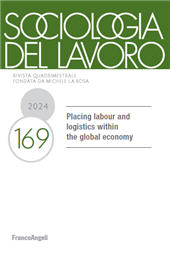Dal campo allo schermo : influenze sociologiche nel cinema realista di Ken Loach
195-207 p.
A giugno 2024 Ken Loach ha compiuto 88 anni. Il regista inglese ha annunciato che âÂThe Old Oak', uscito nel 2023, sarà il suo ultimo film. Benché non sia la prima volta che Loach annunci il proprio ritiro dalle scene, questi avvenimenti offrono un'occasione per provare a tratteggiare un'analisi della sua estesa filmografia. Il suo cinema realista e la sociologia hanno un legame significativo, che merita di essere analizzato più di quanto non abbia fatto un abbondante critica letteraria che si è occupata del regista inglese. Il saggio parte dall'analisi di alcuni dei suoi film chiave dedicati al lavoro e alla condizione operaia per mostrare le intersezioni epistemologiche tra cinema realista e sociologia.
Si conclude soffermandosi sulla particolare traiettoria del regista inglese che, dopo una fase di documentazione di numerose esperienze di conflitto, sembra suggerire invece un certo pessimismo nella fase più matura, dove viene meno l'idea di una possibilità di trasformazione del mondo che veda protagonisti i lavoratori. È forse un cinema che ha rinunciato all'indagine degli orizzonti di emancipazione per limitarsi a testimoniare una nostalgia per il vecchio mondo operaio e per le sue vecchie forme di organizzazione? O è ancora uno strumento per innescare nuovi processi di presa di coscienza critica e trasformazione? [Testo dell'editore].
In June 2024 Ken Loach turned 88 years old. The British director has announced that 'The Old Oak,' released in 2023, will be his last film. Although this is not the first time Loach has announced his retirement from the stage, these events offer an opportunity to sketch an analysis of his extensive filmography that includes works that won the Palme d'Or at Cannes (The Wind That Shakes The Barley (2006) and I, Daniel Blake, (2016). His realist cinema has a significant link with sociology and it deserves to be analyzed going beyond the abundant literary criticism that has dealt with the British filmmaker. The essay begins by analyzing some of his key films devoted to labor and the working-class condition and it shows the epistemological intersections between realist cinema and sociology.
It concludes by dwelling on the particular trajectory of the filmography of the British director, who, after documenting numerous experiences of conflict, in his later works seems to suggest instead a certain pessimism toward workers' capacity to transform of the world. Is this perhaps a cinema that has given up the investigation of the horizons of emancipation to merely bear witness to a nostalgia for the old working-class world and its old forms of organization? Or is his realist cinema an important tool to trigger new forms of critical consciousness and transformation? [Publisher's text].
Fa parte di
Sociologia del lavoro : 169, 2, 2024-
Articoli dello stesso fascicolo (disponibili singolarmente)
-
Informazioni
Codice DOI: 10.3280/SL2024-1690010
ISSN: 1972-554X
MATERIE
PAROLE CHIAVE
- Ken Loach, sociology, realist cinema, working-class culture, social inquiry


